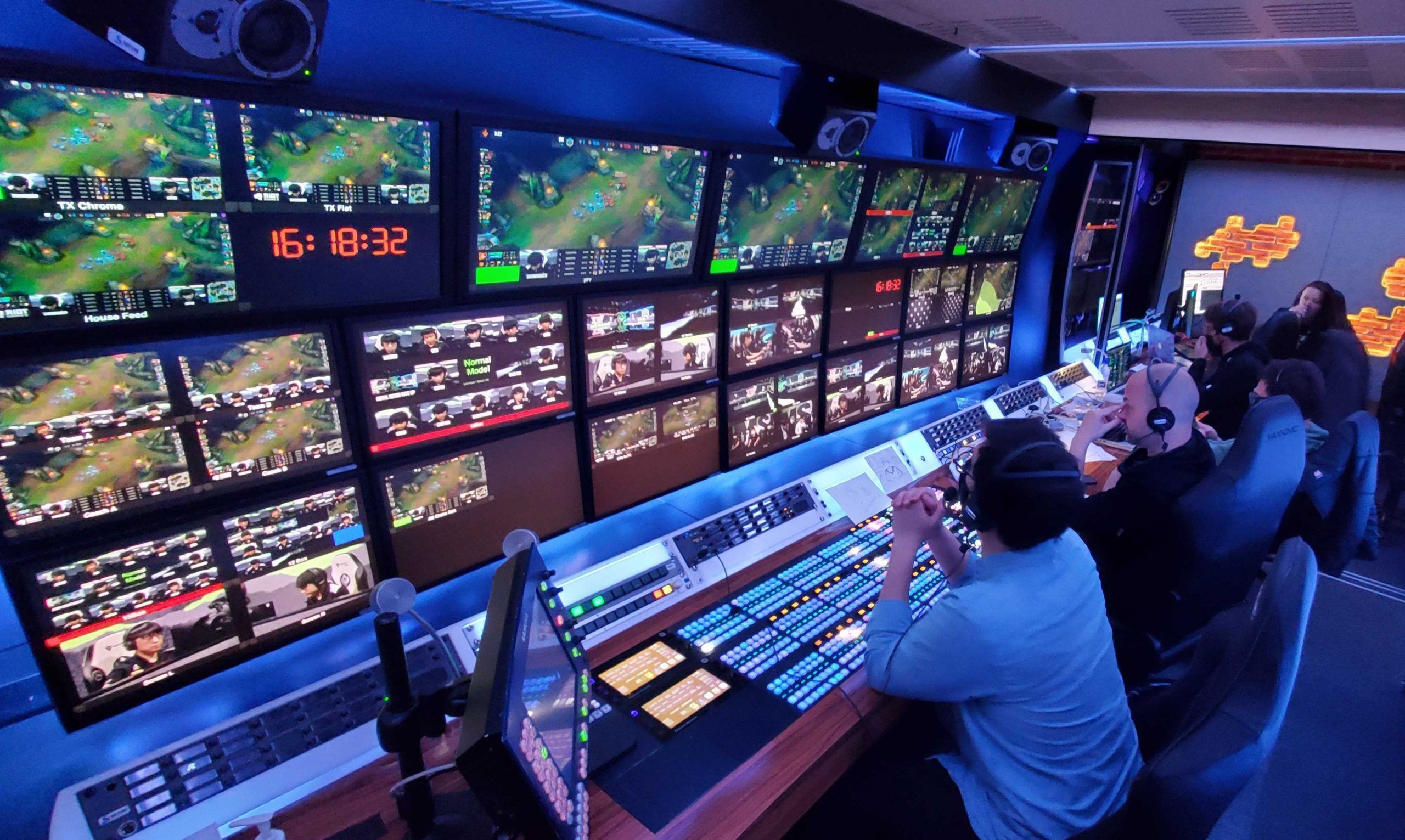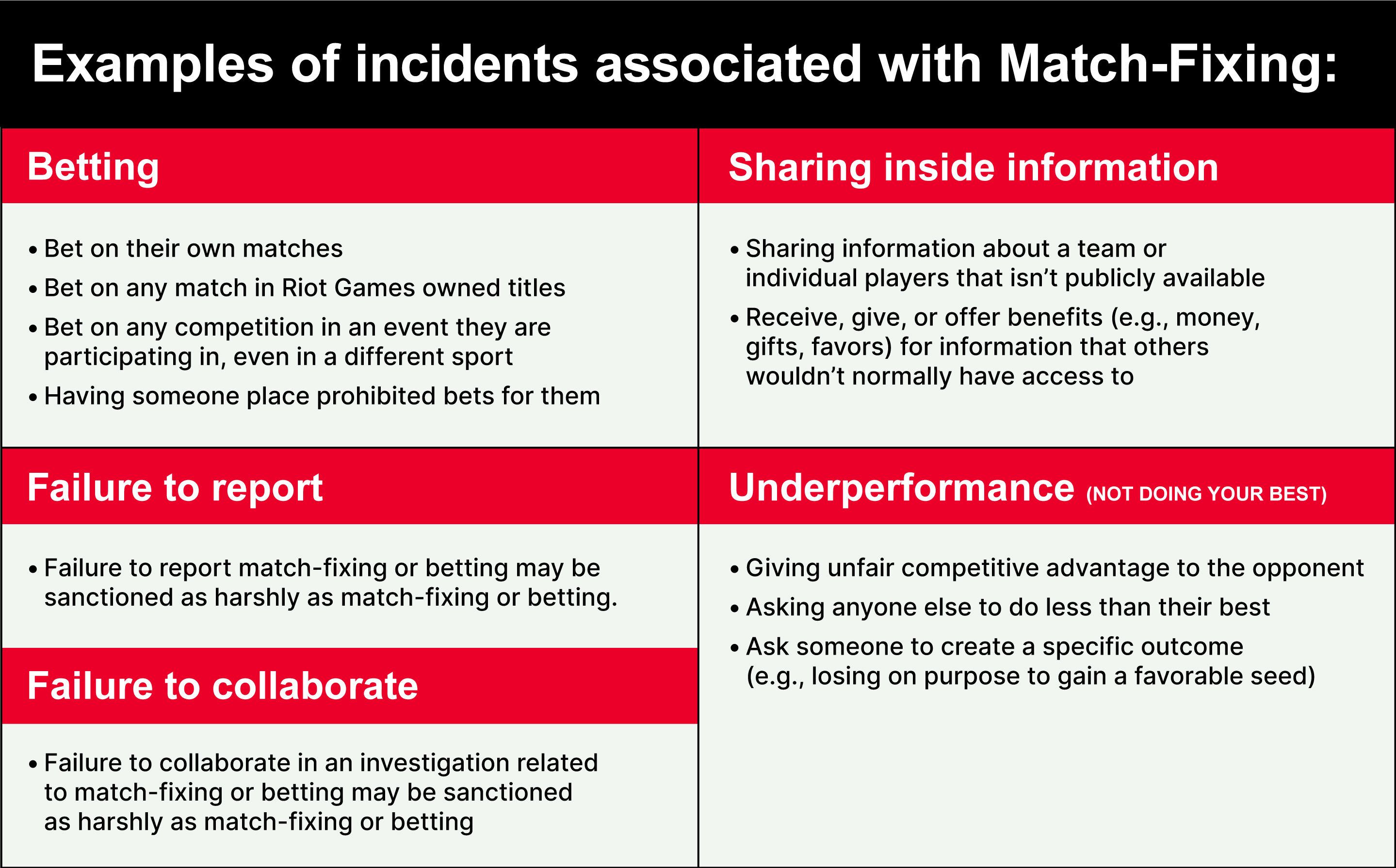
Anti-Match-Fixing: Protecting Riot Games’ Esports Ecosystem through Fair Play and Integrity
Protecting Riot Games Esports Ecosystem through Fair Play and Integrity
Integrity in Esports
At Riot putting players first is our top priority. In esports, that means that every match must be fair, fun, and competitive. The integrity of esports is crucial to its success and longevity.
Upholding and promoting fair play is essential for preserving the credibility and respect that esports commands from players, fans, and other stakeholders alike.
Cheating, match-fixing, and inappropriate betting can damage the entire esports community by eroding trust and spoiling the game for everyone involved. As both esports and betting continue to grow and evolve, we’re expanding our integrity programs to address the emerging challenges and complexities in these areas.
Our goal is to create a safe, trustworthy, and exciting environment rooted in integrity. By implementing clear rules and taking decisive actions, we aim to keep our games fair. Through collaboration with players, teams, and other stakeholders, we work to uphold the integrity of competition and ensure a level playing field for all involved. Right now, let’s talk match-fixing.
What is Match-fixing and Why Is It a Problem?
Match-fixing occurs when individuals, such as players or other team members, manipulate the outcome of a match or specific in-game events, usually for personal gain. This manipulation can involve deliberately losing a game or controlling certain game elements (referred to as “spot-fixing”) to meet predetermined conditions.
Match-fixing undermines the fairness and excitement that make esports thrilling to watch and play. It damages trust, compromises competitive integrity, and can lead to severe consequences, such as legal charges, tournament bans, and a tarnished reputation for both the sport and the individuals involved.

Safeguarding the Competition
At Riot we’ve developed a structured framework to mitigate the risk of match-fixing. This framework is continuously evolving to address emerging threats and ensure that esports competitions remain competitive.
Our multifaceted strategy focuses on four key areas:
Regulations and Processes: Implementing a clear legal framework mandating strict adherence to anti-match-fixing rules is crucial. The Riot Games Esports Global Code of Conduct sets the standard for our esports titles, requiring all participants to uphold the highest standards of fair play. This regulatory framework is multi-layered, ensuring explicit acceptance by teams, referees, and key operational members.
Prevention and Education: Education is a cornerstone of our anti-match-fixing strategy. The effectiveness of our regulations depends on esports professionals fully understanding the risks and consequences of match-fixing. Through education programs and communication campaigns, we aim to foster a culture of awareness and compliance.
Deterrence and Enforcement: We take decisive disciplinary actions against violations, reaffirming our commitment to maintaining competitive integrity. A dedicated team conducts thorough investigations and enforces the rules against those who compromise the integrity of esports. Incidents of match-fixing, gambling, and failure to report are amongst the most serious breaches of the Riot Games Esports Global Code of Conduct and are often subject to harsh penalties. Each case is evaluated individually, considering all mitigating and aggravating factors to ensure fairness in our rulings.
Transparency and Communication: We build and maintain trust by openly communicating our processes to the community. While we strive for transparency, there are instances where we must comply with national legal requirements or protect whistleblowers, limiting the amount of information we can share. Our goal is to balance openness with the need for confidentiality in sensitive matters.
Challenges and Solutions
The digital nature of esports presents unique challenges. We've adapted our strategies to include advanced technological solutions and enhanced local capabilities to take swift and effective action against integrity breaches.
For a more detailed analysis of specific esports risk factors, please refer to Sportradar's Betting Corruption and Match-Fixing 2023 report.
Key Partnerships and Technology in Action
By leveraging technology to enhance our integrity programs we’re able to better detect and prevent match-fixing and betting-related violations. These efforts are bolstered through strategic partnerships that safeguard the integrity of our esports data and provide reliable information that aids in investigations and disciplinary actions:
Sportradar: Since 2019, we’ve partnered with Sportradar, a leading sports technology company specializing in data and integrity. Initially focused on bet monitoring for major League of Legends international and regional competitions, the partnership has expanded to cover multiple tiers of competition, including academy and regional Tier-2 leagues, as well as the VALORANT Champions Tour. Today, Sportradar supports Riot as an independent and impartial integrity partner to monitor, detect, and investigate suspected match-fixing incidents across esports competitions. Sportradar’s Universal Fraud Detection System (UFDS) utilizes advanced technology to monitor global betting markets from over 600 betting operators, including access to individual betting stakes to identify suspicious betting patterns at an account level. Currently, Sportradar monitors over 8,000 matches per year across our sanctioned competitions, 25 leagues, and international competitions globally. Additionally, Sportradar’s Intelligence & Investigation Services assist Riot Games in gathering intelligence and conducting end-to-end investigations into potential match-fixing.
IBIA: In 2024, we signed a Memorandum of Understanding (MoU) with the International Betting Integrity Association (IBIA) to share integrity information. IBIA is a not-for-profit body that is run by betting operators for betting operators to protect regulated sports betting markets from match-fixing. It represents over 50 of the world’s leading betting companies which operate over 125 sports betting brands and generate more than $300B in annual betting turnover (handle). They account for approximately 50% of the global commercial regulated land-based and online sports betting sector, and in excess of 50% for online alone. IBIA’s global monitoring network is a highly effective anti-corruption tool, detecting and reporting suspicious activity in regulated betting markets including esports. Through the IBIA monitoring network it is possible to track transactional activities linked to individual customer accounts; this global customer account data is only available to IBIA and its members.
GRID: GRID delivers real-time official esports data for League of Legends Esports and the VALORANT Champions Tour. This partnership ensures the availability of reliable and secure esports data, reinforcing the trustworthiness of our overall integrity program.
IIntelligence and Investigations
The esports community is highly perceptive and quick to discuss potential match-fixing incidents on social media. However, spotting suspicious activity is not enough for us to take action. Each case requires thorough investigations backed by solid evidence before we can pass a ruling.
When a match appears suspicious, we assess the sporting performances, analyze betting patterns, and may conduct interviews with potentially involved parties. Additional evidence is gathered from various sources, including social media and public data, to ensure a complete understanding of the situation.
Once the suspicions appear to be confirmed and before making a final ruling, the accused individuals are given the opportunity to provide a statement. This ensures that all decisions are fair and based on concrete information. Investigations can last several months, during which provisional suspensions may be imposed to protect the integrity of the competition and prevent further harm to the ecosystem.
While strict confidentiality is maintained during investigations, the final competitive rulings are
typically made public through Riot’s esports channels.
Collaboration with Law Enforcement and Governmental Bodies
We actively maintain relationships with law enforcement agencies, government bodies, and non-governmental organizations to enhance our ability to combat match-fixing. These collaborations keep us informed about legal advancements that strengthen protections for esports and ensure compliance with local laws on a global scale. Sharing our esports-specific expertise with these organizations further enables them to make informed decisions regarding the esports ecosystem. Working closely with law enforcement is especially critical, as match-fixing is often linked to broader criminal activities and is considered a criminal offense in many countries.
Continuing the Fight Against Match-Fixing
At Riot we remain committed to enhancing anti-match-fixing measures in Riot Esports by continuously developing new strategies and adopting cutting-edge technologies. Our ongoing dedication to education, enforcement, and collaboration with various stakeholders demonstrates our resolve to address and prevent match-fixing in the esports ecosystem.